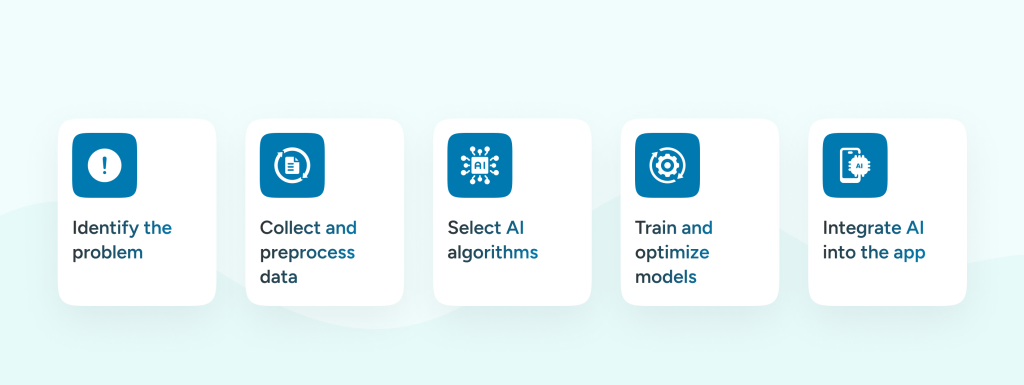Artificial Intelligence (AI) is transforming the way mobile apps are developed, revolutionizing the entire landscape of the industry. In this comprehensive guide, we will delve into the role of AI in mobile app development and explore the potential it holds for the future.
With advancements in machine learning and natural language processing, AI has opened up an ocean of possibilities for mobile app developers. From predictive analytics and personalization to chatbots and virtual assistants, AI-powered apps are changing the way we interact with technology.
By incorporating AI algorithms, mobile apps are becoming smarter, more intuitive, and capable of adapting to user behaviour. This leads to enhanced user experiences, and increased engagement, and ultimately, translates into higher conversion rates. The ability to analyze vast amounts of data and make data-driven decisions enables developers to create apps that are highly targeted and tailored to individual user needs.
Furthermore, AI-powered mobile apps have the potential to revolutionize industries such as healthcare, finance, and education, by offering personalized solutions and improving efficiency. Being a leading AI mobile app development company, we help our clients leverage the power of AI to create innovative apps that solve real-world problems. Our team of experts has a proven track record of delivering successful AI-powered mobile apps.
In this comprehensive guide, we will explore the different ways AI is influencing mobile app development and how developers can leverage its power to create innovative and successful applications. Stay tuned to discover the future of AI in mobile app development powered by AI.
Advantages Of Using AI In Mobile App Development
AI-powered mobile apps offer numerous advantages that enhance user experiences, increase engagement, and drive higher conversion rates. By incorporating AI algorithms, these apps become smarter, more intuitive, and capable of adapting to user behaviour.
One of the key advantages of AI in mobile app development is predictive analytics. AI algorithms can analyze vast amounts of data, enabling developers to make data-driven decisions. This data analysis helps in understanding user preferences, behaviour, and patterns, allowing developers to create highly targeted and personalized apps.
Another advantage is personalization. AI-powered mobile apps can provide tailored experiences to individual users. By analyzing user data, the apps can recommend relevant content, products, or services, leading to increased user satisfaction and engagement.
Moreover, AI enables the development of chatbots and virtual assistants, which have become increasingly popular in mobile apps. These AI-powered assistants can answer user queries, provide recommendations, and even perform tasks on behalf of the user. This not only improves user experiences but also saves time and effort.
AI also plays a crucial role in improving app security. With AI algorithms, mobile apps can detect and prevent potential security threats, such as malware or fraud attempts. This ensures the safety and privacy of user data, instilling trust in the app and its developers.
In summary, the advantages of using AI in mobile app development include predictive analytics, personalization, chatbots and virtual assistants, and improved app security. These advantages contribute to enhanced user experiences, increased engagement, and higher conversion rates.
AI-powered Features In Mobile Apps
AI has enabled the development of various features in mobile apps that enhance functionality and user experiences. These features leverage AI algorithms to provide intelligent and intuitive interactions.
One popular AI-powered feature is voice recognition. Mobile apps can now understand and interpret spoken commands, enabling hands-free operation. Voice recognition is used in virtual assistants, voice-controlled navigation, and voice-based search functionalities.
Another AI-powered feature is natural language processing (NLP). With NLP, mobile apps can understand and interpret human language, allowing users to interact with the app using natural language. This enables features such as voice-based chatbots, language translation, and sentiment analysis.
AI has also revolutionized image recognition in mobile apps. With AI algorithms, apps can analyze and interpret images, enabling functionalities such as object recognition, facial recognition, and augmented reality. These features have applications in various industries, including e-commerce, gaming, and social media.
Furthermore, AI-powered mobile apps can use machine learning algorithms to make intelligent recommendations based on user preferences and behaviour. These recommendations can be for products, content, or services, enhancing personalization and user satisfaction.
Overall, AI-powered features in mobile apps include voice recognition, natural language processing, image recognition, and intelligent recommendations. These features make apps more intelligent, intuitive, and user-friendly.
Examples Of Successful Mobile Apps Utilizing AI
Several mobile apps have successfully leveraged AI to provide innovative and valuable experiences to their users. These apps have embraced AI-powered features and functionalities, setting new benchmarks in the industry. Let’s explore some notable examples:
1. Google Maps
Google Maps utilizes AI algorithms for various features, including real-time traffic updates, route suggestions, and personalized recommendations. The app analyzes data from millions of users to provide accurate and up-to-date information, making it an indispensable tool for navigation.
2. Netflix
Netflix uses AI to optimize its recommendation engine, providing personalized content suggestions to its users. The app analyzes user viewing patterns, ratings, and preferences to offer a curated list of movies and TV shows tailored to individual tastes. This enhances user engagement and satisfaction.
3. Snapchat
Snapchat’s filters and augmented reality features are powered by AI algorithms. The app uses facial recognition to apply filters and effects to user photos and videos, creating engaging and interactive experiences. This has made Snapchat one of the most popular social media apps among younger demographics.
4. Duolingo
Duolingo is a language-learning app that utilizes AI to personalize the learning experience for each user. The app analyzes user performance and adapts the difficulty level and content accordingly. This ensures efficient and effective language learning, making Duolingo a preferred choice for millions of users worldwide.
Apart from these platforms, the Starbucks app uses AI to provide personalized recommendations and offers based on user preferences and purchase history. Another example is the Google Photos app, which uses AI-powered image recognition to automatically organize and tag photos, making it easier for users to search and find specific images.
These examples demonstrate how AI can be effectively integrated into mobile apps to provide unique and valuable experiences. By leveraging AI-powered features, these apps have achieved success and gained a competitive edge in their respective industries.
Challenges & Limitations Of AI in Mobile App Development
While AI offers numerous advantages, it also comes with its own set of challenges and limitations when it comes to mobile app development. Developers need to be aware of these challenges and find ways to overcome them.
One of the major challenges is the availability of quality data. AI algorithms require large amounts of data to learn and make accurate predictions. Obtaining clean, relevant, and representative data can be a complex task, especially for new or niche mobile apps. Developers need to ensure data integrity and reliability to achieve optimal results.
Another challenge is the complexity of AI algorithms. Developing and implementing AI algorithms in mobile apps requires specialized knowledge and expertise. It can be a time-consuming and resource-intensive process, especially for small development teams or startups. Collaborating with AI experts or utilizing pre-trained models can help overcome this challenge.
Furthermore, there are ethical concerns associated with AI in mobile app development. AI algorithms can inadvertently reinforce biases or discriminatory behaviours if not properly designed and tested. Developers need to ensure fairness, transparency, and accountability when integrating AI into their apps.
Additionally, AI-powered mobile apps may face compatibility issues with older devices or operating systems. Ensuring seamless performance across different devices and platforms can be a challenge, requiring thorough testing and optimization.
The challenges and limitations of AI in mobile app development include data availability, algorithm complexity, ethical concerns, compatibility issues, and potential impact on job markets. By addressing these challenges, developers can harness the full potential of AI while mitigating risks.
Current Trends and Statistics In AI-powered Mobile Apps
The adoption of AI in mobile app development is rapidly increasing, driven by technological advancements and evolving user expectations. According to a report by Grand View Research, the global AI in the mobile app market is expected to reach $52.2 billion by 2025, growing at a CAGR of 28.4% from 2019 to 2025. This growth is fueled by the demand for personalized user experiences, enhanced app functionality, and improved business efficiency.
One of the prominent trends in AI-powered mobile apps is the integration of virtual assistants. Virtual assistants, such as Apple’s Siri or Amazon’s Alexa, use natural language processing and machine learning algorithms to understand user queries and provide relevant information. These virtual assistants are becoming more sophisticated and capable of performing complex tasks, like booking appointments or making online purchases, further enhancing the user experience.
How To Integrate AI Into Your Mobile App Development Process

Integrating AI into the mobile app development process requires careful planning and execution. Here are some steps to guide developers in incorporating AI effectively:
1. Identify the problem
Start by identifying the specific problem or opportunity that AI can address in your mobile app. Determine how AI can enhance user experiences, improve functionality, or optimize processes.
2. Collect and preprocess data
Gather relevant data that will be used to train and test your AI algorithms. Ensure the data is clean, representative, and properly labelled. Preprocess the data by removing noise, normalizing values, and handling missing data.
3. Select AI algorithms
Choose the appropriate AI algorithms based on the problem you are trying to solve. Consider factors such as data type, complexity, and performance requirements. Common AI algorithms used in mobile app development include neural networks, decision trees, and support vector machines.
4. Train and optimize models
Train your AI models using the collected and preprocessed data. Fine-tune the models by adjusting hyperparameters, optimizing loss functions, and employing regularization techniques. Validate the models using a separate validation dataset.
5. Integrate AI into the app
Integrate the trained AI models into your mobile app using suitable programming languages and frameworks. Ensure seamless communication between the AI components and the rest of the app’s functionality. Test the app thoroughly to ensure proper functioning.
6. Monitor and update
Continuously monitor the performance of your AI models in real-world scenarios. Collect feedback from users and measure key performance metrics. Regularly update and improve your AI models based on the feedback and evolving user needs.
By following these steps, developers can successfully integrate AI into their mobile app development process, unlocking the potential for enhanced user experiences and improved app performance.
Tools & Technologies For AI-powered Mobile App Development

Numerous tools and technologies are available to aid developers in implementing AI-powered features in mobile apps. These tools provide the necessary frameworks, libraries, and resources to streamline the development process. Here are some popular options:
1. TensorFlow
TensorFlow is an open-source machine learning framework developed by Google. It provides a comprehensive ecosystem for building and deploying AI models, including support for neural networks, deep learning, and natural language processing. TensorFlow offers a user-friendly interface and supports various programming languages.
2. PyTorch
PyTorch is another popular open-source machine learning framework that emphasizes flexibility and ease of use. It provides a dynamic computational graph, making it suitable for rapid prototyping and experimentation. PyTorch is widely used for deep learning applications and offers extensive libraries and tools.
3. Keras
Keras is a high-level neural network API written in Python. It provides a user-friendly interface for building and training neural networks. Keras is known for its simplicity and ease of use, making it a popular choice for beginners in AI development. It supports multiple backends, including TensorFlow and PyTorch.
4. Amazon Web Services (AWS)
AWS offers a range of AI services and tools for mobile app development. These include Amazon Lex for building chatbots, Amazon Rekognition for image and video analysis, and Amazon Polly for text-to-speech conversion. AWS provides scalable and cost-effective solutions for AI-powered mobile apps.
5. Microsoft Azure
Microsoft Azure offers a comprehensive suite of AI services and tools, covering areas such as natural language processing, computer vision, and speech recognition. Azure provides pre-trained models, APIs, and SDKs that simplify the integration of AI into mobile apps. It also offers a cloud-based infrastructure for scalable AI deployments.
These tools and technologies provide developers with the necessary resources to implement AI-powered features in mobile apps efficiently. Developers should evaluate their specific requirements and choose the tools that best align with their development goals.
Best Practices For Implementing AI In Mobile Apps
Implementing AI in mobile apps requires careful consideration and adherence to best practices. By following these guidelines, developers can ensure successful integration and optimal performance of AI-powered features:
1. Start with a clear objective
Clearly define the problem or opportunity that AI will address in your mobile app. Set specific goals and metrics to measure the success of your AI implementation.
2. Collect quality data
Gather relevant and representative data that reflects the real-world scenarios your app will encounter. Ensure the data is clean, properly labelled, and covers a diverse range of cases.
3. Regularly update and retrain models
AI models should be continuously updated and retrained to adapt to changing user needs and preferences. Collect feedback from users and incorporate it into the model training process.
4. Ensure user privacy and data security
Implement robust data protection measures to ensure the privacy and security of user data. Comply with relevant regulations and industry best practices to build trust with your users.
5. Optimize for performance
Pay attention to performance optimization to ensure smooth and responsive user experiences. Consider factors such as algorithm efficiency, memory usage, and network latency.
6. Test thoroughly
Test your AI-powered mobile app extensively to identify and fix any bugs or performance issues. Conduct both unit tests and user acceptance tests to ensure proper functionality and usability.
By following these best practices, developers can maximize the benefits of AI in mobile app development while minimizing risks and ensuring a high-quality user experience.
Future Trends In AI & Mobile App Development

The future of AI in mobile app development is filled with exciting possibilities and trends that will continue to shape the industry. Here are some key trends to watch out for:
1. Conversational AI
Conversational AI, including chatbots and virtual assistants, will become more sophisticated and capable of handling complex interactions. Natural language processing and machine learning advancements will enable more natural and human-like conversations.
2. Emotion and sentiment analysis
AI algorithms will be able to analyze and interpret human emotions and sentiments from user interactions. This will enable apps to provide personalized experiences based on emotional states and preferences.
3. Edge computing
AI algorithms will be increasingly deployed on edge devices, such as smartphones and IoT devices, to enable real-time processing and reduce reliance on cloud infrastructure. This will lead to faster response times and enhanced privacy.
4. Explainable AI
As AI becomes more pervasive, there will be a growing need for transparency and explainability. AI models and algorithms will be designed to provide clear explanations for their decisions, addressing concerns about bias and ethical implications.
5. AI-powered app development frameworks
Developers will have access to more AI-powered app development frameworks that simplify the integration of AI into mobile apps. These frameworks will offer pre-trained models, drag-and-drop interfaces, and automated model selection.
6. AI-driven app monetisation
AI-powered mobile apps will explore new monetization models, such as personalized recommendations, targeted advertising, and subscription services. AI algorithms will optimize revenue generation while providing value to users.
The future of AI and mobile app development is bright and full of potential. Continued advancements in AI algorithms, tools, and technologies will enable developers to create even more innovative, intelligent, and user-friendly mobile apps.
Conclusion: Embracing AI For The Future Of Mobile App Development
AI is revolutionizing mobile app development, offering numerous advantages and opportunities for developers. By leveraging AI-powered features, mobile apps can provide enhanced user experiences, personalized content, and intelligent interactions.
From predictive analytics and personalization to chatbots and virtual assistants, AI-powered mobile apps are changing the way we interact with technology. They are transforming industries such as healthcare, finance, and education by offering personalized solutions and improving efficiency.
While AI comes with its own set of challenges and limitations, developers can overcome them by following best practices and utilizing the available tools and technologies. By embracing AI, developers can unlock the full potential of mobile app development and create innovative and successful applications.
As the future of AI and mobile app development unfolds, developers must stay updated with the latest trends and advancements. By embracing AI and harnessing its power, developers can shape the future of mobile apps and create experiences that truly make a difference.
Choose Aipxperts As Your AI Mobile App Development Partner!
Aipxperts is a leading AI mobile app development company that offers cutting-edge solutions. Our team of experienced professionals can help you leverage the power of AI and create amazing mobile apps that deliver real-world value. Contact us today to get started.
AI In Mobile App Development | Hire experienced AI mobile app developers from Aipxperts. Contact us for project estimates and enjoy a 15-day risk-free trial period.







